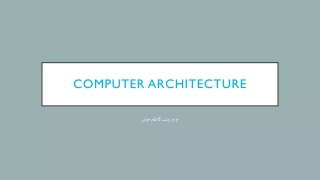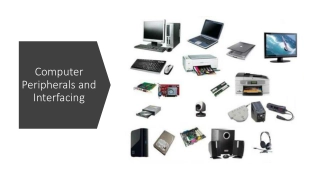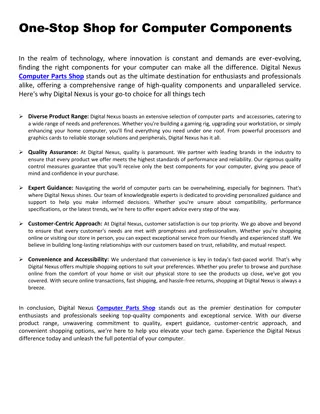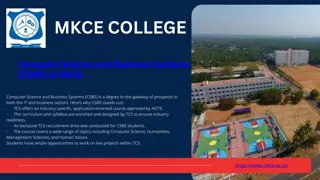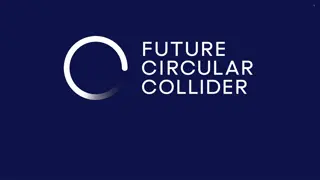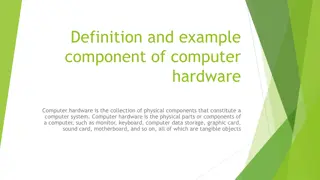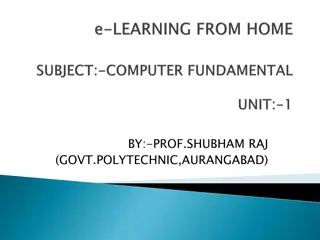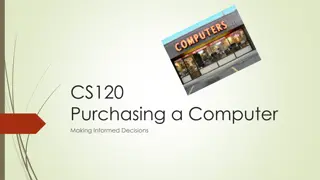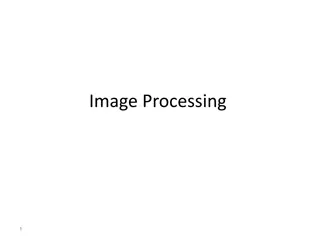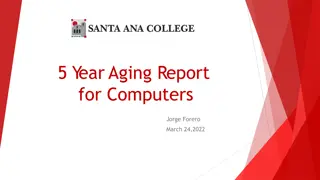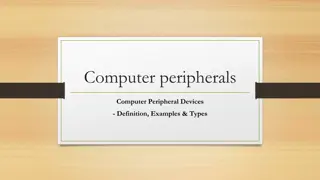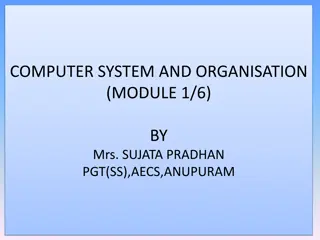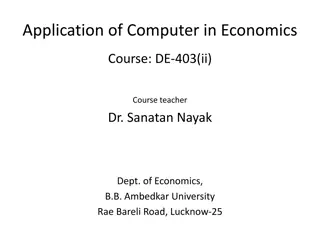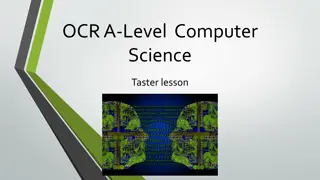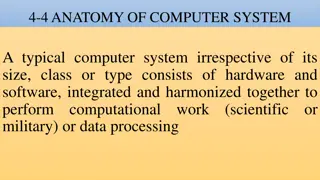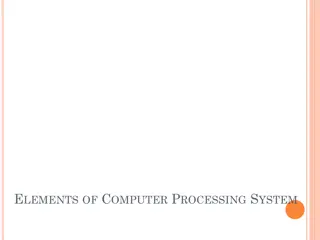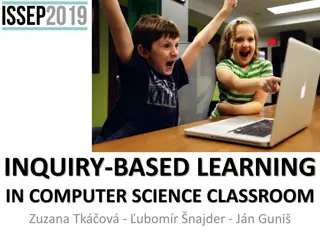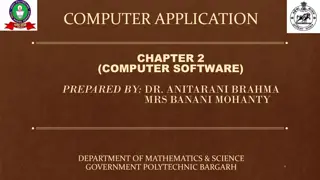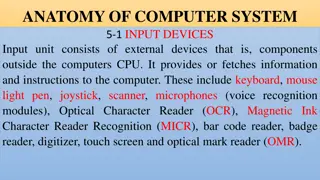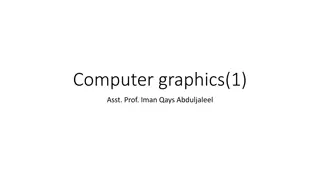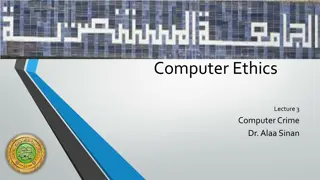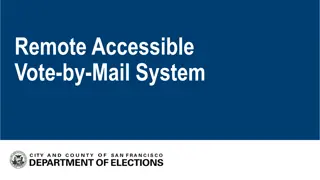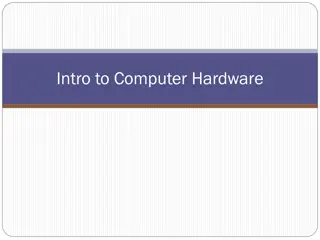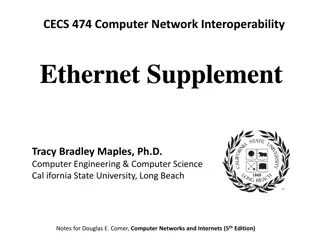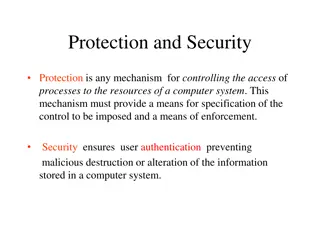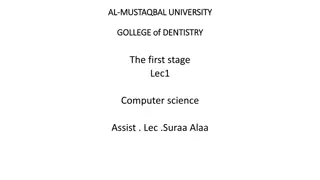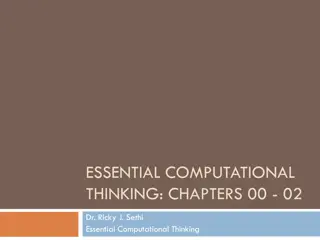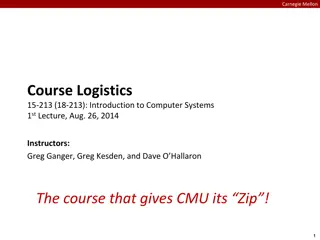Rescue Drone: Increasing Autonomy and Implementing Computer Vision
Focuses on developing a rescue drone with increased autonomy and implementing computer vision for advanced object detection. The team, consisting of Cody Campbell (Hardware Engineer), Alexandra Borgesen (Computer Engineer), Halil Yonter (Team Leader), Shawn Cho (Software Engineer), Peter Burchell (M
78 views • 44 slides
Computer Components and Microprocessor: Understanding Computer Architecture
Explore the main computer components and learn about the operation of these components, including inputting, storing, processing, outputting, and controlling. Understand the role of the microprocessor in computer processing and its characteristics such as instruction set, bandwidth, and clock speed.
11 views • 20 slides
Role of Computer Science in Modern Society
Computer science plays a crucial role in various sectors of life, from business to education. It encompasses a wide range of disciplines, including software development, hardware engineering, system designing, networking, and database administration. The field's scope extends beyond traditional comp
1 views • 20 slides
Computer Peripherals and Interfacing
Computer peripherals are external devices that enhance the functionality of a computer. They include input devices like keyboards and mice, output devices like printers and monitors, and storage devices like hard disk drives and solid-state drives. Interfacing circuits connect these peripherals to t
1 views • 6 slides
Understanding Computer Organization and Architecture
A computer system is a programmable digital electronics device that processes data as per program instructions to provide meaningful output. It comprises hardware and software components, with hardware being the physical parts and software essential for driving the hardware. Computer organization fo
14 views • 71 slides
Explore the World of Computer Graphics in CSE452
Dive into the fascinating realm of computer graphics with CSE452. Learn about modeling, rendering, animation, and its various applications in entertainment, design, education, and more. Discover the techniques of computer-aided design, 3D scanning, procedural modeling, and rendering for photorealist
12 views • 24 slides
Introduction to Components of a Computer System in Home Science
Explore the components of a computer system in Home Science, including input devices like the keyboard, alphanumeric keypads, cursor movement keys, and special keys such as Enter, Ctrl, Esc, and more. Learn about the internal structure of a computer system and the key functions of CPU, ALU, memory,
8 views • 12 slides
2022 Thales Access Management Index
Thales Access Management Index highlights the current landscape of access security, revealing insights on multi-factor authentication adoption, remote and privileged user access management, VPN usage trends, challenges faced, and preferences towards third-party access management. The report emphasiz
2 views • 9 slides
One-Stop Shop for Computer Components
Buy retailer price and all latest desktop component prices in Bangladesh at computer village buy your desire computer parts price in Bangladesh see all computer accessories price casing, ram, graphic card, hard disk, SSD, cooling fan, etc\n
10 views • 1 slides
Computer Science and Business Systems (CSBS) at MKCE
Computer Science and Business Systems (CSBS) at MKCE\nWelcome to the world of Computer Science and Business Systems (CSBS) at M.Kumarasamy College of Engineering (MKCE), an avant-garde and industry-specific program designed to forge the future leaders of technology and business. Moreover, if you\u20
0 views • 2 slides
Personnel Safety Systems and Access Control at CERN Facilities
Personnel Safety Systems at CERN include ODH detection, fire safety measures, and access control to protect personnel from hazards. Various access control layers are implemented to regulate entry to different parts of the facility, ensuring only trained personnel access underground areas. Biometric
0 views • 19 slides
Overview of Computer Hardware Components and Software Functions
Computer hardware components such as monitor, CPU, mouse, and projector are essential physical parts of a computer system, while software includes intangible programs like operating systems and utility software. Hardware components perform tasks like displaying data, processing information, and prin
8 views • 9 slides
Understanding the Basics of Computer and Its Components
A computer is an electronic device that processes data input by the user to provide output results. It comprises components like ALU, CU, and MU, each with specific functions. The CPU acts as the brain of the computer, transforming raw data into information. The system's memory units, RAM and ROM, s
2 views • 12 slides
Essential Guide to Computer Purchasing Decisions
Learn about different computer types, hardware options, necessary features, and internal components to make informed decisions when purchasing a computer. Explore the differences between desktops, laptops, tablets, smartphones, and more, along with a breakdown of input and output options, processing
2 views • 11 slides
Understanding Computer Vision and Image Processing
Introduction to the fields of computer vision and image processing, exploring their differences and how they intertwine. Computer vision focuses on processing images for computer use, while image processing enhances images for human consumption. Topics include image analysis, restoration, enhancemen
1 views • 100 slides
Comprehensive Report on Computer Aging and Replacement Plan
This detailed report provides insights into the aging of computers categorized by fiscal years, use type, and cost. It includes statistics on instructional and non-instructional desktops and laptops, accompanied by corresponding cost breakdowns. Additionally, the report outlines the funding mileston
1 views • 8 slides
Advancing Computer Science and STEM Education in Rural Lancaster County
PA Smart Grants, spearheaded by Governor Tom Wolf, are driving the advancement of computer science and STEM education in Pennsylvania. Manheim Central, along with other institutions, has secured grants to expand access to these crucial fields. Initiatives range from early childhood STEM programs to
2 views • 9 slides
Understanding Computer Architecture and Organization
Computer architecture and organization are fundamental aspects of computing systems. Computer architecture focuses on the functional design and implementation of various computer parts, while computer organization deals with how operational attributes come together to realize the architectural speci
3 views • 40 slides
Understanding Computer Peripheral Devices: Definition, Examples, and Types
Learn about computer peripheral devices, which enhance a computer system's functionality. Examples include mice, keyboards, monitors, printers, and scanners. These devices can be categorized into input, output, and storage devices, each serving a specific purpose to expand the capabilities of your c
2 views • 13 slides
Understanding Computer System and Organization
Computer Organization involves the logical structure of a computer, defining the interconnections of components for optimal performance. Computers process data through an Input-Process-Output cycle, with input, processing, and output units working together. The characteristics of a computer include
1 views • 20 slides
Application of Computer in Economics Course: DE-403(ii) with Dr. Sanatan Nayak
Computer application in economics is essential for data management and analysis. The course covers definitions, features, basic computer organization, and evolution. It explores the characteristics of computers such as high speed, accuracy, diligence, versatility, and memory power. The evolution of
2 views • 194 slides
Dive into OCR A-Level Computer Science Taster Lesson
Explore the world of OCR A-Level Computer Science through a taster lesson covering fundamental principles, computational thinking, problem-solving, and more. Unveil the creative and practical aspects of computer science, offering a blend of theory and real-world applications. Delve into computer sys
1 views • 20 slides
Computer Science Department Information and Courses Offered
The Computer Science Department provides information on courses offered for GCSE or BTEC qualifications, specifically focusing on the AQA GCSE in Computer Science. The course equips students with valuable thinking and programming skills essential in the modern workplace, covering key concepts and pr
3 views • 7 slides
Anatomy of a Computer System: Hardware Components and Functions
A typical computer system consists of hardware and software working together to perform various computational tasks. The hardware components include the central processing unit (CPU), input/output devices, storage units, and the motherboard. The CPU acts as the main brain of the computer, performing
6 views • 6 slides
Understanding Computer Processing Systems
Computer processing systems consist of various components such as the control unit, ALU, input unit, CPU, output unit, memory, and more. Input devices feed raw data to the computer, while output devices provide processed information. The CPU plays a crucial role in executing instructions and data pr
0 views • 13 slides
**Exploring Inquiry-Based Learning in Computer Science Education**
Inquiry-based learning (IBL) in computer science classrooms focuses on fostering communication, collaboration, decision-making, and problem-solving skills among students. The approach involves students constructing knowledge through independent, active activities based on real-world experiences. How
0 views • 18 slides
Evolution of Algorithms and Computer Science Through History
The history of algorithms and algorithmic thinking dates back to ancient times, with the development of general-purpose computational machines by Charles Babbage in the 19th century marking a significant advancement. The term "computer science" emerged in 1959, encompassing theoretical computer scie
1 views • 39 slides
Understanding Computer Software and Operating Systems
Computer software, comprising system software and application software, plays a crucial role in managing computer resources and facilitating user instructions. System software consists of control programs, support programs, and development programs, while application software assists in specific tas
1 views • 26 slides
Overview of Computer Input and Output Devices
Input devices of a computer system consist of external components like keyboard, mouse, light pen, joystick, scanner, microphone, and more, that provide information and instructions to the computer. On the other hand, output devices transfer information from the computer's CPU to the user through de
0 views • 11 slides
Understanding Computer Graphics: An Overview
Computer graphics involves creating images and animations using a computer through hardware and software systems. It has evolved significantly over the years, with advancements in generating various types of computer graphics. Learn about the basics of computer graphics, including digital image repr
0 views • 15 slides
Understanding Computer Crimes and Prevention Strategies
Computer crimes involve illegal acts utilizing computer systems, leading to various consequences. This lecture covers the types of computer system attacks, motives behind computer crimes, costs, prevention strategies, and reflection on the discussed topics. It emphasizes the increasing scope of comp
1 views • 20 slides
Accessible Voting System for Californians with Disabilities
Learn about the Remote Accessible Vote-by-Mail System in California, designed to empower voters with disabilities to securely access, mark, and return their ballots from any computer with internet access. Find out who is eligible to use the system, how to access and return the ballot, and the steps
0 views • 23 slides
Understanding Computer Hardware Components
Computer hardware refers to the physical components of a computer system that you can see and touch. This includes the system unit, which contains components such as the CPU (Central Processing Unit), motherboard, RAM (Random Access Memory), power supply, expansion cards, and modem. Understanding th
0 views • 22 slides
Open Access at Charles University: Opportunities and Challenges
Charles University is navigating the landscape of open access following the implementation of the Czech National Open Access Strategy. The university is working towards making all research articles and proceeding papers open access, monitoring article processing charges, and promoting open access as
0 views • 24 slides
Understanding Ethernet and Multiple Access Protocols in Computer Networks
Exploring the fundamentals of Ethernet and multiple access protocols in computer networks, this content discusses the two primary categories of multiple access protocols - contention access and controlled access. It delves into topics such as CSMA/CD, LANs, performance of multiple access schemes, ad
0 views • 7 slides
Understanding Computer System Protection and Security
Mechanisms like protection and security ensure controlled access to a computer system's resources and prevent malicious activities. Protection involves defining access control levels through models, policies, and mechanisms. Security focuses on user authentication to safeguard stored information. Di
0 views • 25 slides
Overview of Computer Science at Al Mustaqbal University College of Dentistry
Al Mustaqbal University College of Dentistry offers courses in computer science, covering topics like data reception, processing, storage, and output. The curriculum includes the study of computers as electronic devices, data and information, computer features, operating systems like Windows, and ta
0 views • 10 slides
Understanding the Essence of Computer Science and Computational Thinking
Delve into the fundamentals of Computer Science and Computational Thinking through chapters discussing the nature of science, predictions in physics, and the distinction between Computer Science and Computer Information Systems. Explore the relationships between Math, Physics, and Computer Science i
0 views • 29 slides
Carnegie Mellon Course Logistics: Introduction to Computer Systems
Carnegie Mellon University offers the course 15-213: Introduction to Computer Systems, taught by instructors Greg Ganger, Greg Kesden, and Dave O. Hallaron. The course covers essential topics in computer systems and programming, emphasizing practical skills through lectures, labs, and exams. Recomme
0 views • 23 slides
The Impact of Globalisation on Cybercrime and Computer-aided Crime
Globalisation has brought about significant social changes that have led to the emergence of new forms of crime, facilitated by advancements in computer technology. Cybercrime and computer-aided crime have become prevalent in contemporary societies, with activities ranging from identity theft and el
0 views • 8 slides

